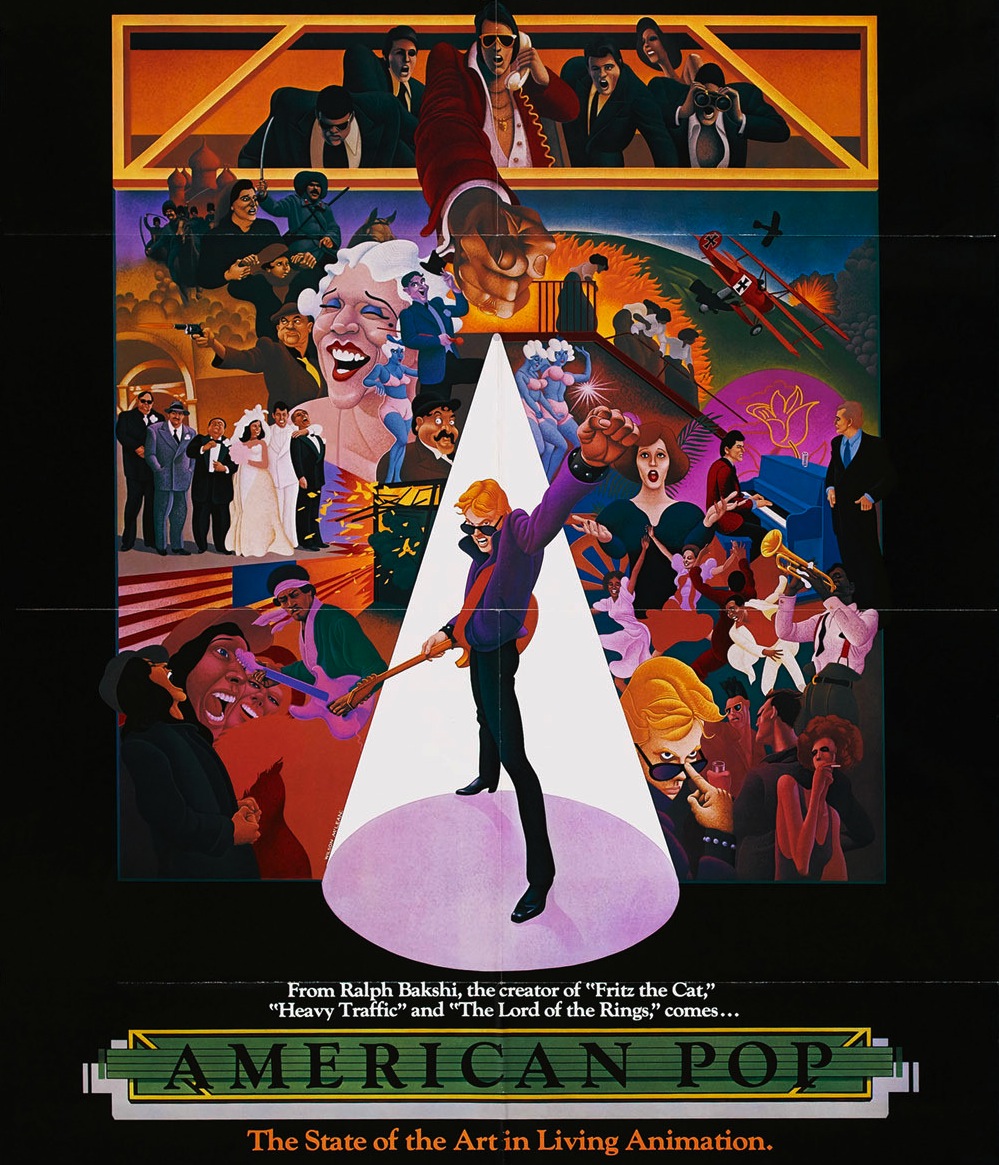Monday, April 6, 1981.
AMERICAN POP. Written by Ronni Kern. Music by Lee Holdridge. Directed by Ralph Bakshi. Running time: 96 minures. Rated Mature with the B.C. Classifier's warning: May not be suitable for young children.
IN THE TELLING, American Pop has the sweep of a saga and the intensity of an epic. "It's all about America from 1800 to contemporary times, about success and how making it took on such an over-riding importance in this country."
That's Ralph Bakshi talking. In 1978, with his animated adaptation of The Lord of the Rings about to go into release, the then-40 year-old director discussed his hopes for the future and a new feature cartoon project.
"l don't want to do rabbits chasing mice," he told me in an interview. "I want to do what live-action directors do, and do it in my own medium.
"The kind of stories I want to make have political and adventure themes. Artists should make feelings. I want to capture what you see in a Vegas casino, for example: the hunger of the people at the slot machines."
American Pop. "It's about how some men become heroes, while leaving a trail of bodies behind them all the way. The Rockefellers, the rock scene, the drug scene, Vegas — it's all in there."
Yes, it is an interesting, even great idea. The trouble is that Bakshi talked a better movie than he made. On the screen, American Pop — billed as "the State of the Art in Living Animation" — is a big, boring bust.
The epic intent is there. Like Francis Ford Coppola's Godfather films, it attempts to reflect the immigrant experience. As it opens, little Zalmie Belinski (the voice of Barney Pell) is fleeing a Czarist pogrom, the sound of the traditional Ukrainian chant Aneynu in his ears.
Music is the unifying element as we follow the Belinski seed through four generations. We meet the adult Zalmie (Jeffrey Lippa), then Benny (Richard Singer), Zalmie's piano-tickling, jazz-oriented son, Tony (Ron Thompson), Benny's footloose, guitar-strumming son, and Little Pete (Thompson again), Tony's illegitimate offspring, sired one moonlit night in a middle-American cornfield,
The music is there. Arranger Lee Holdridge has mined the pop repertoire to stitch together a score. Among the 49 credited tunes are standards by Scott Joplin, George Gershwin, Cole Porter, Richard Rodgers, Dave Brubeck, Bob Dylan, Jimi Hendrix, Bob Seger and Johnny Rotten.
What's missing is any sense of artistic necessity. The Belinski family chronicle, as presented here, didn't need to be a cartoon feature. With minor exceptions, nothing is seen in American Pop that it isn't possible to see in an imaginatively produced live-action film.
Years ago, Walt Disney described animation as "the art of the plausible impossible." Animation's power comes from its ability to show us things that it we could never see in any other way.
At their best, cartoons take a childlike delight in distilling the essence of pure imagination and expressing it in visual terms. Children, who are in the process of reaching out to reality and exploring their own inner worlds of fantasy, are natural cartoon fans.
Unfortunately, cynicism set in early. Hollywood's entrepreneurs, unable to appreciate the difference between "childlike" and "childish," were blind to art but skilled in exploitation. They decreed that cartoons were for kids.
Television accelerated animation's decline. Its need for cheap filler built the factories that today spew out the sorry effluent that pollutes the Saturday morning airwaves.
Bakshi, understanding all of this, was in the forefront of an adult animation restoration. His daring grew through Fritz the Cat (1972), Heavy Traffic (1973) and Coonskin (1975).
With Wizards (1977), he wavered. His 1978 The Lord of the Rings adaptation, with its heavy dependence on rotoscoping (a technique that involves animators tracing over live-action footage frame by frame), badly misfired. American Pop is another rotoscope job. Its emphasis on "realism" is the publicist's way of making a selling point out of the film's inspirational bankruptcy.
There is no denying that Bakshi had an idea. His dark, despairing tale suggests that any era's hit parade contains within it little more than the muted shrieks of the oppressed.
What he lacks in American Pop is the animator's vision, a unique visual rendering of his idea that could only be achieved in cartoon terms.
The above is a restored version of a Province review by Michael Walsh originally published in 1981. For additional information on this archived material, please visit my FAQ.
Afterword: For years, rotoscoping was one of animation's dirty little secrets. Invented by Max Fleischer, who patented it in 1917, it was the image-referencing method that his Fleischer studios used in its Betty Boop and Superman cartoons. Walt Disney used it in 1937's Snow White and the Seven Dwarfs, but avoided the practice thereafter. "Real" animators eschewed it, because of its limitations on their art and imaginations. Industrial cartoonists, on the other hand, came to rely on it for the wholesale amounts of material it allowed them to crank out. Bakshi, working in the 1970s, was a genuine artist caught between that proverbial rock and a hard place. In the case of American Pop, his execution fell so far short of his ideas as to be embarrassing. Though he retired circa 2000, retirement didn't take. Currently we are awaiting the promised 2014 release of Last Days of Coney Island. The story of an NYPD detective and the prostitute that he both loves and arrests, it's the result of an online Kickstarter campaign and Bakshi's newfound romance with computer animation.
See also: For more on the life and work of adult animation pioneer Ralph Bakshi, check out my 1978 interview with him. The Reeling Back archive also contains reviews of most of his films, including Fritz the Cat (1972); Heavy Traffic (1974); Wizards (1977); The Lord of the Rings (1978); Fire and Ice (1983) and Cool World (1992).
